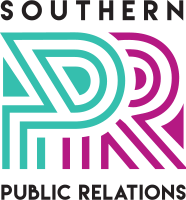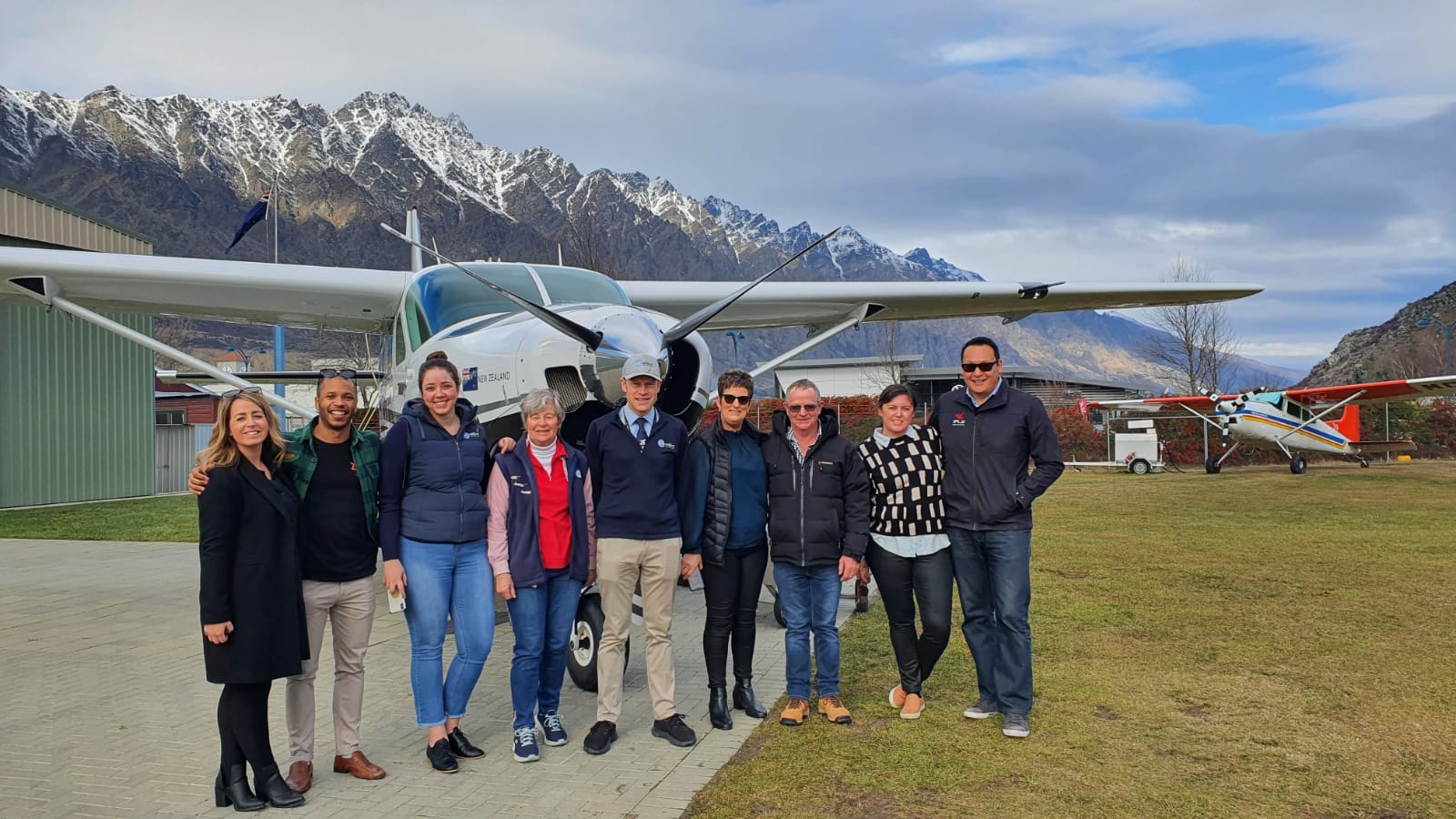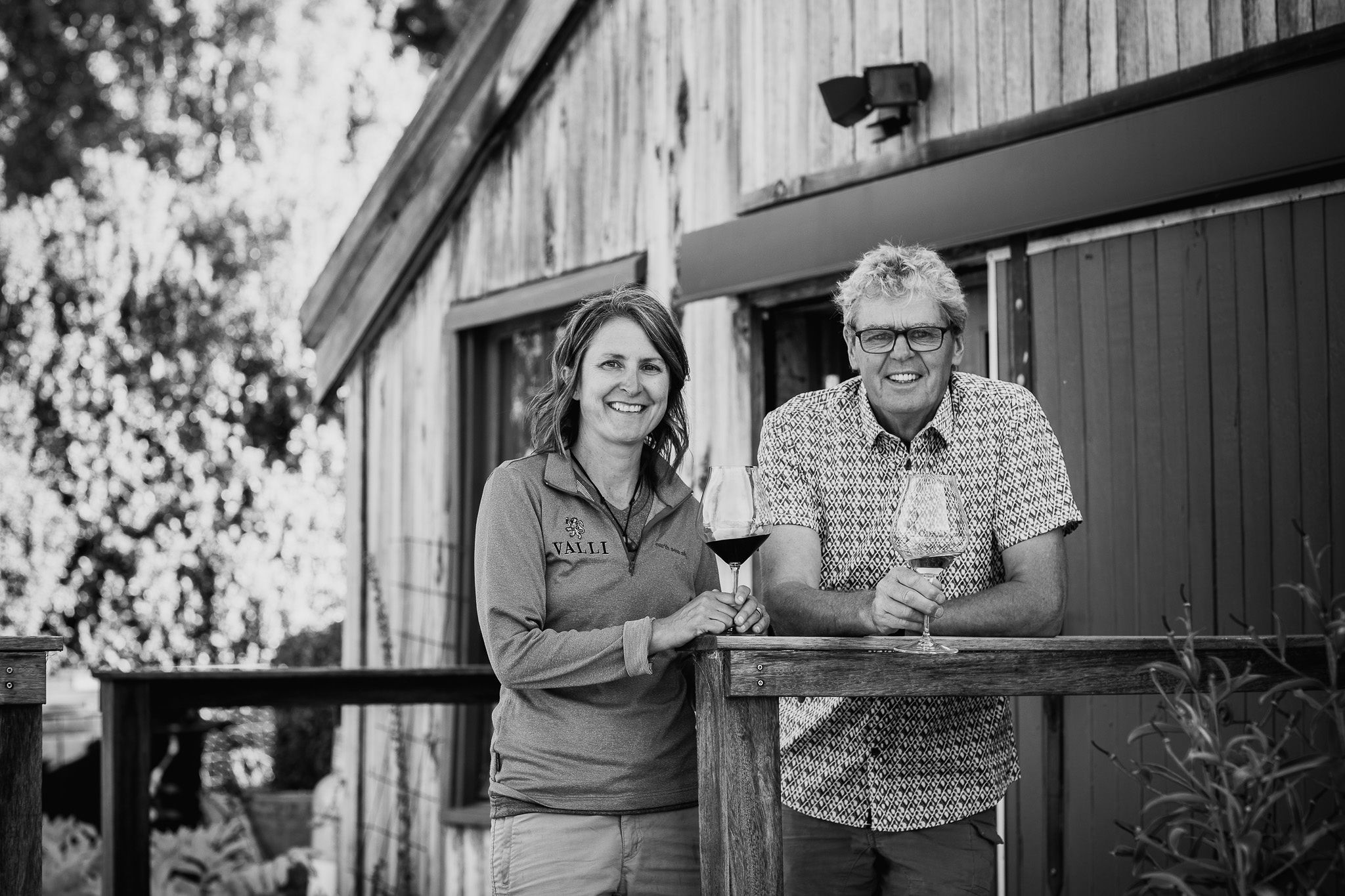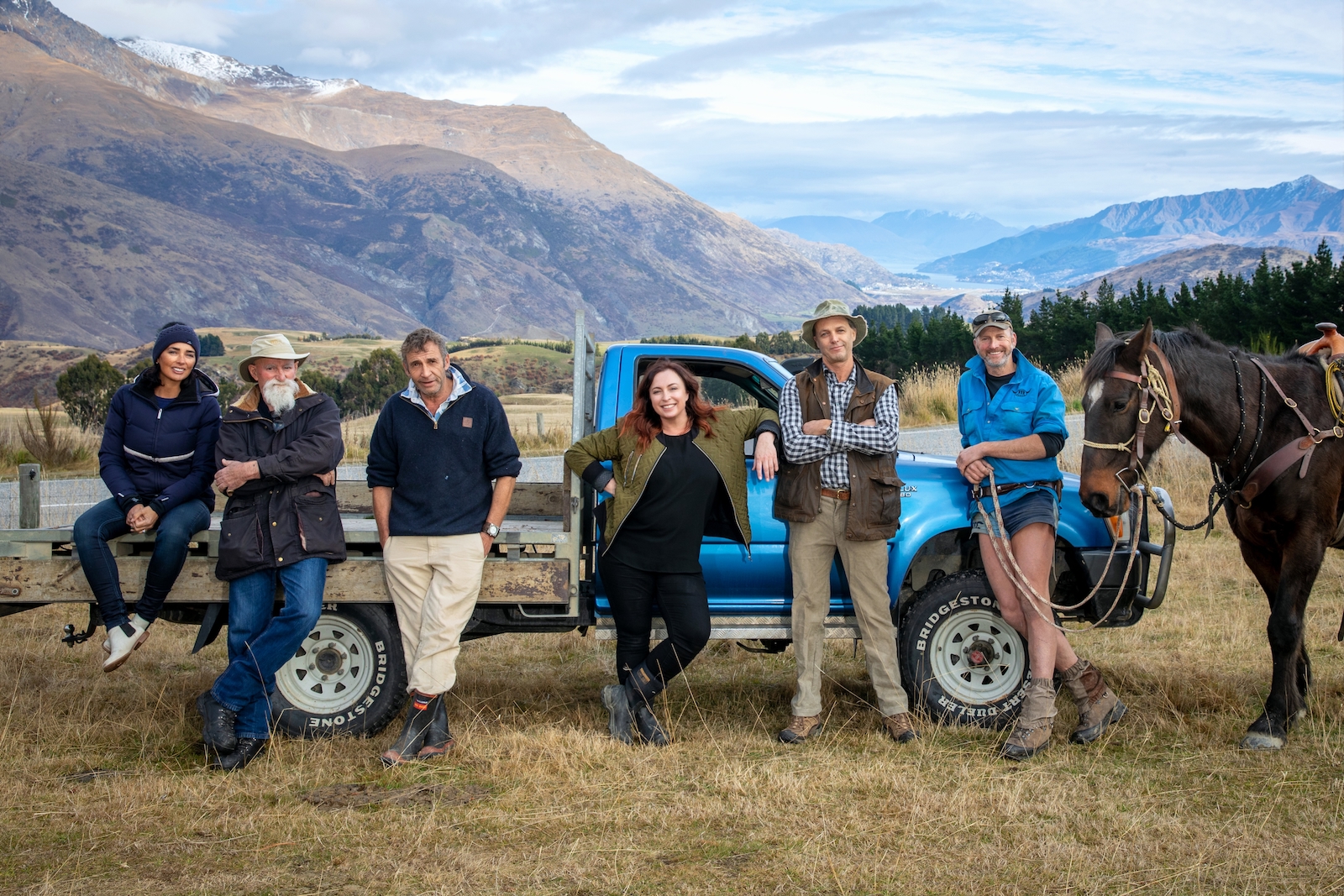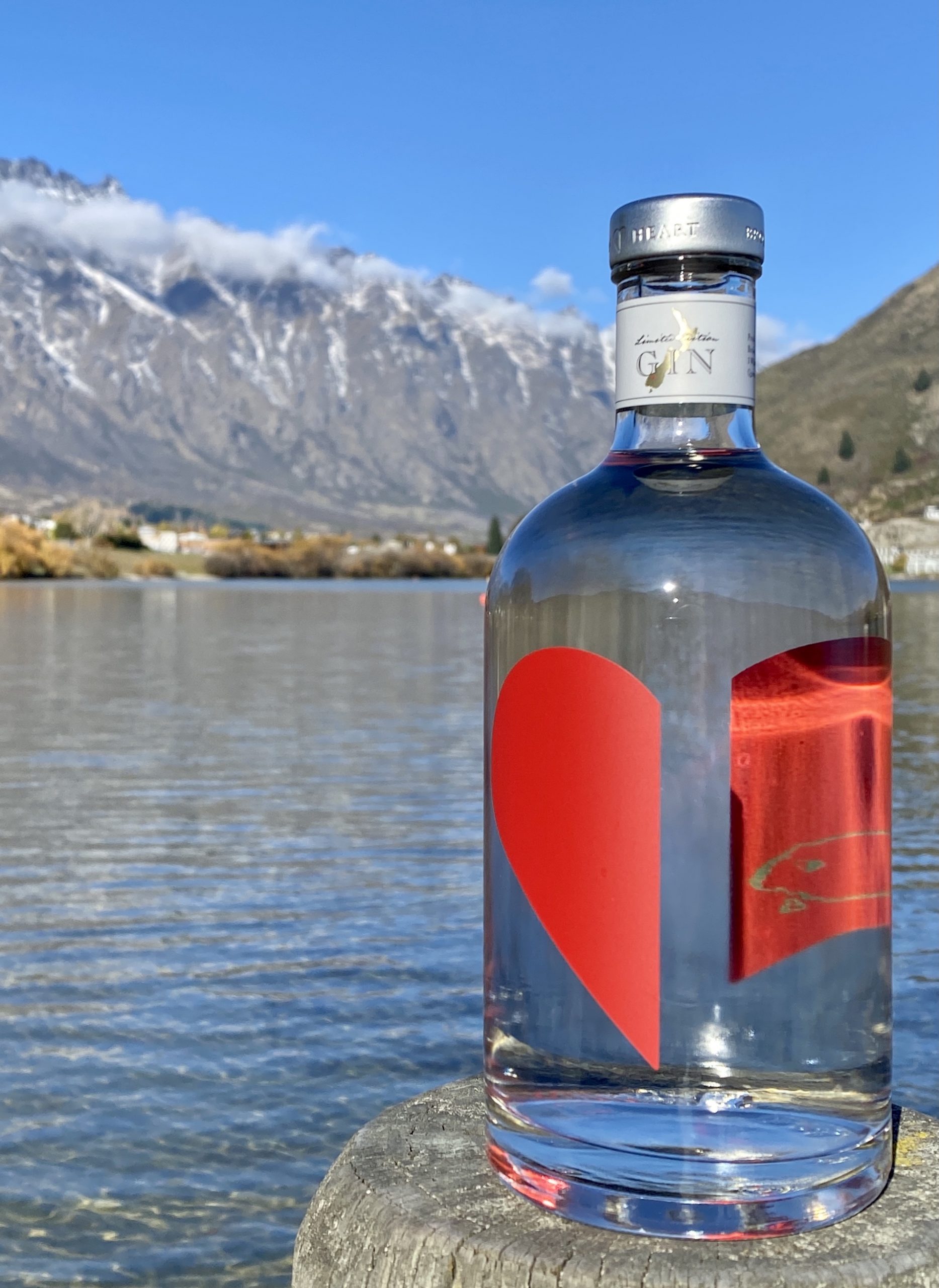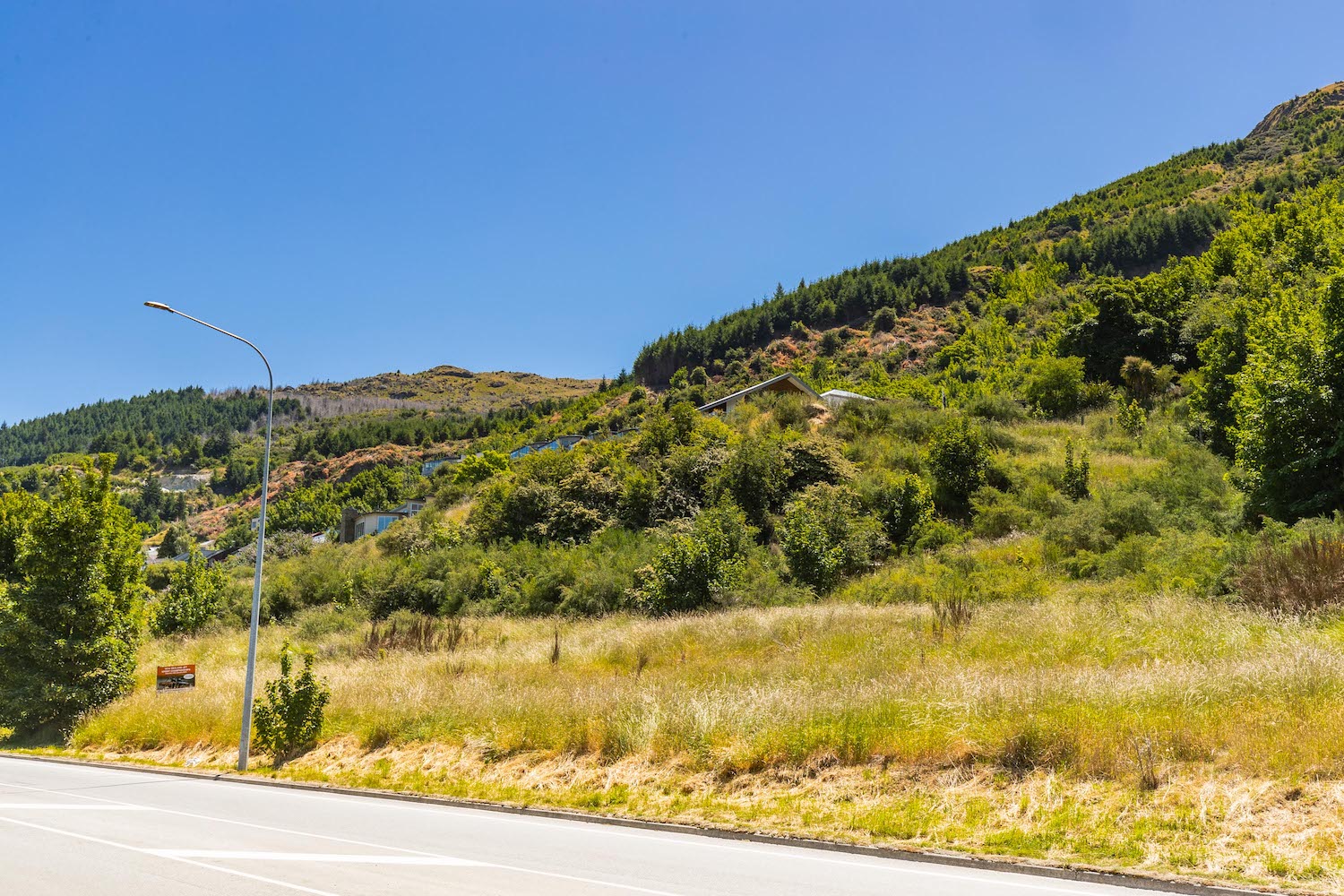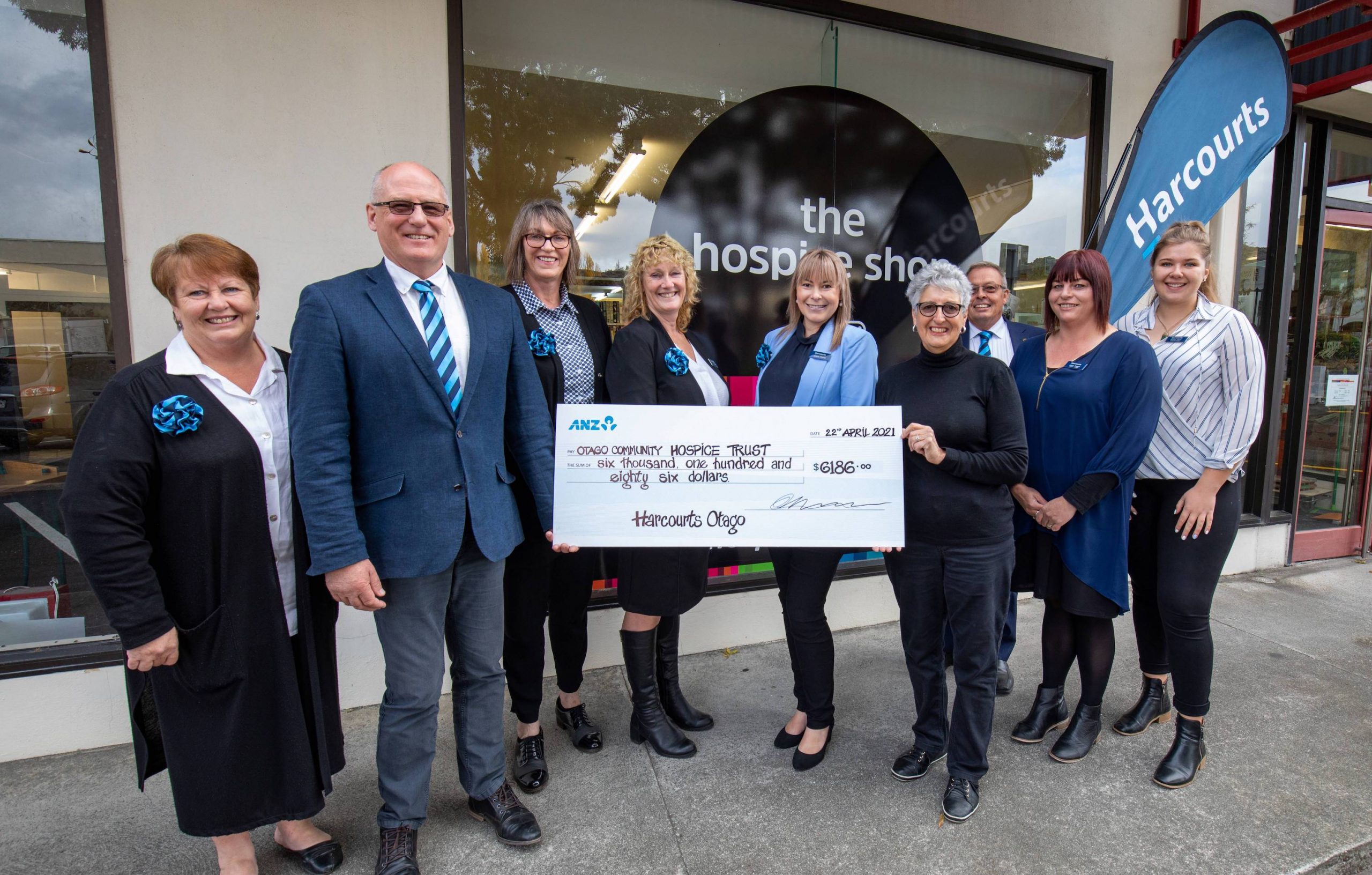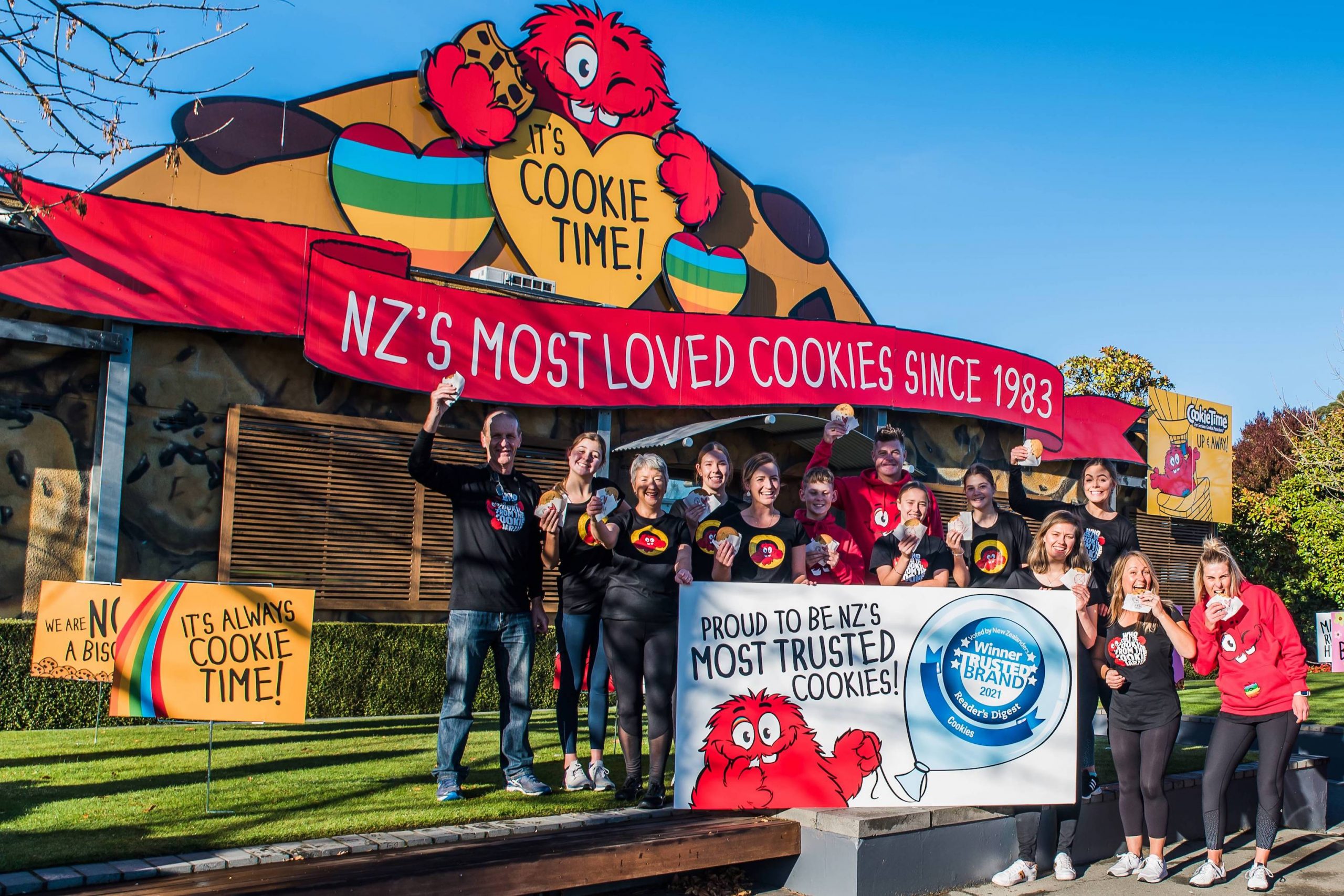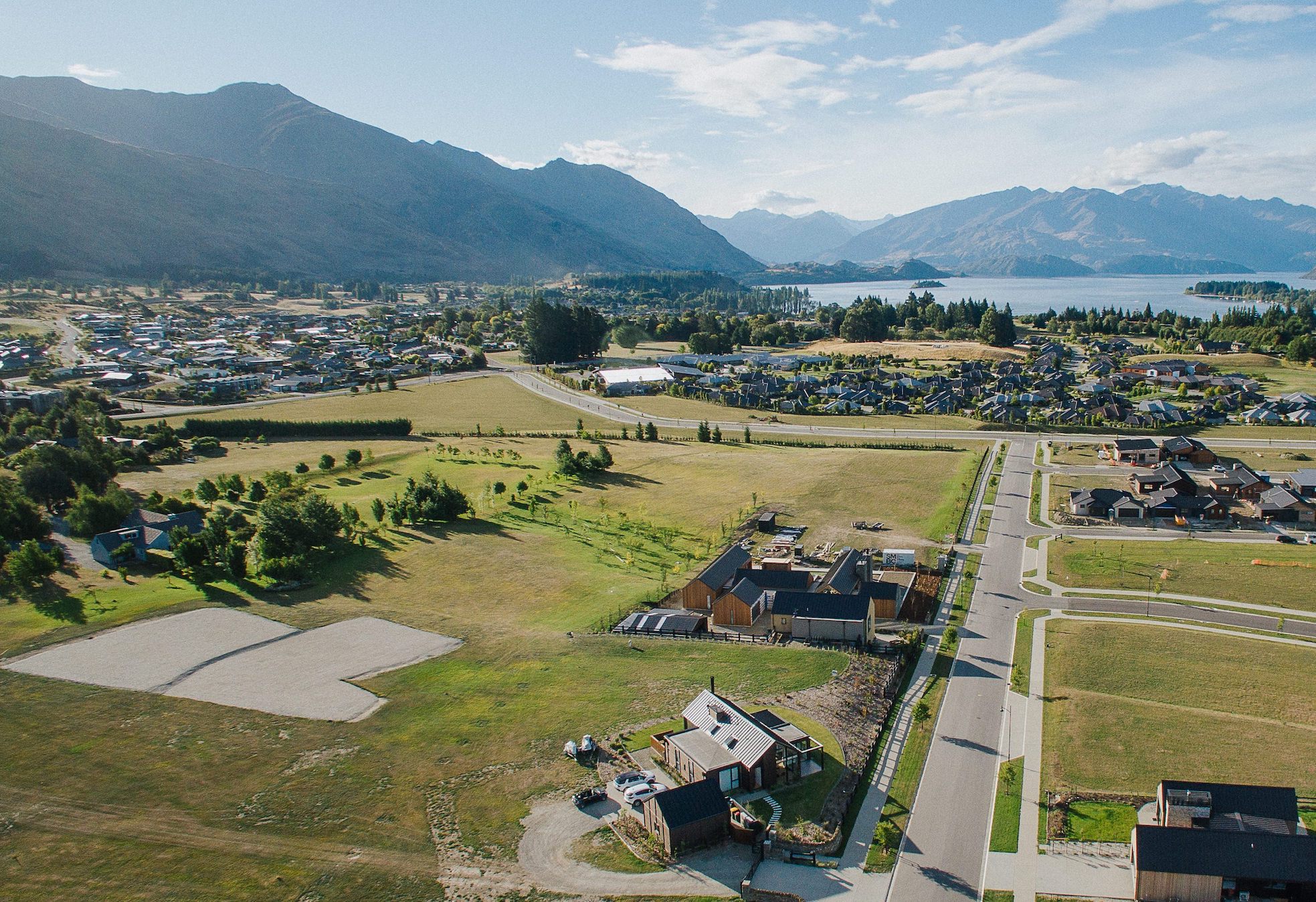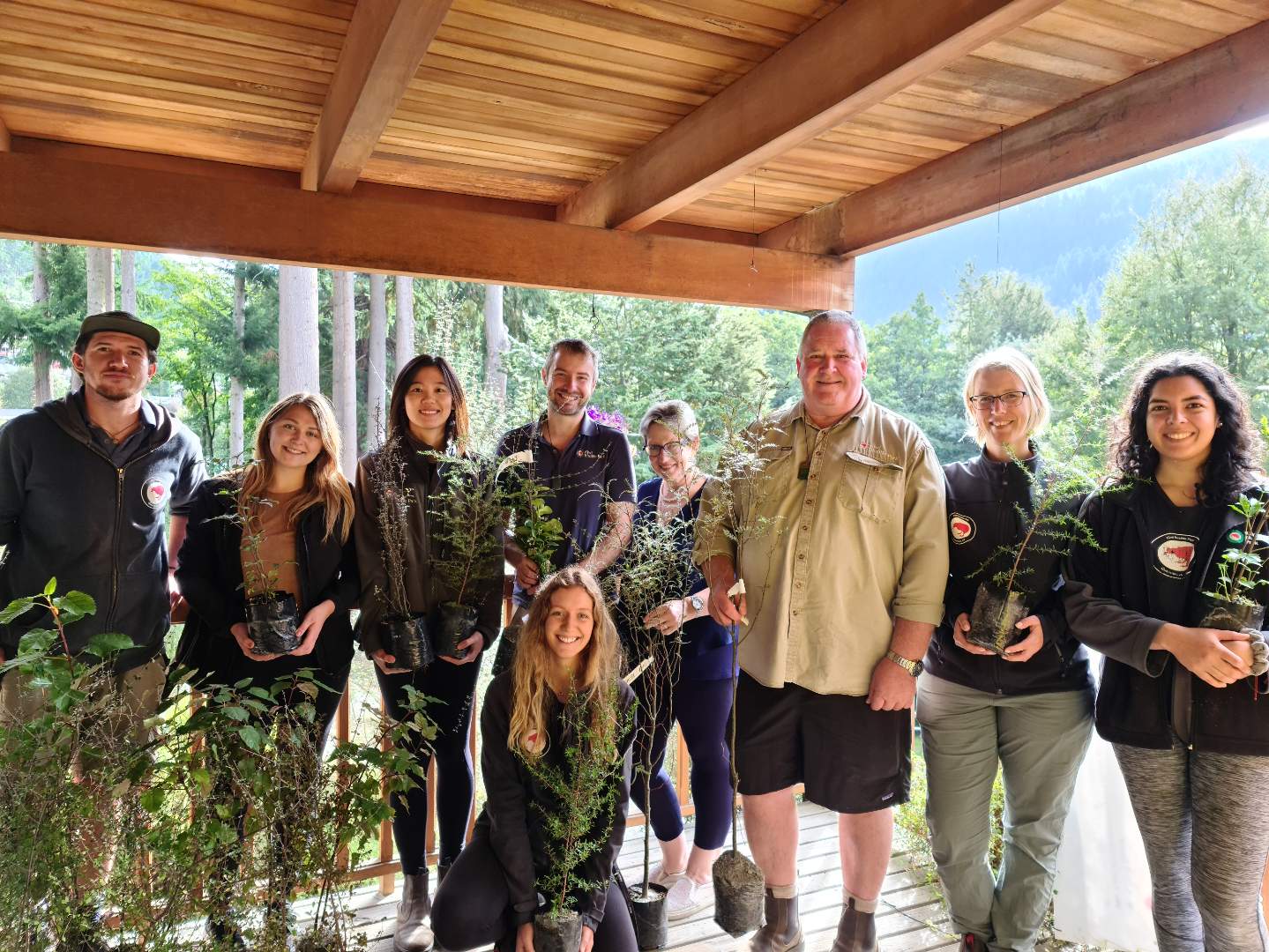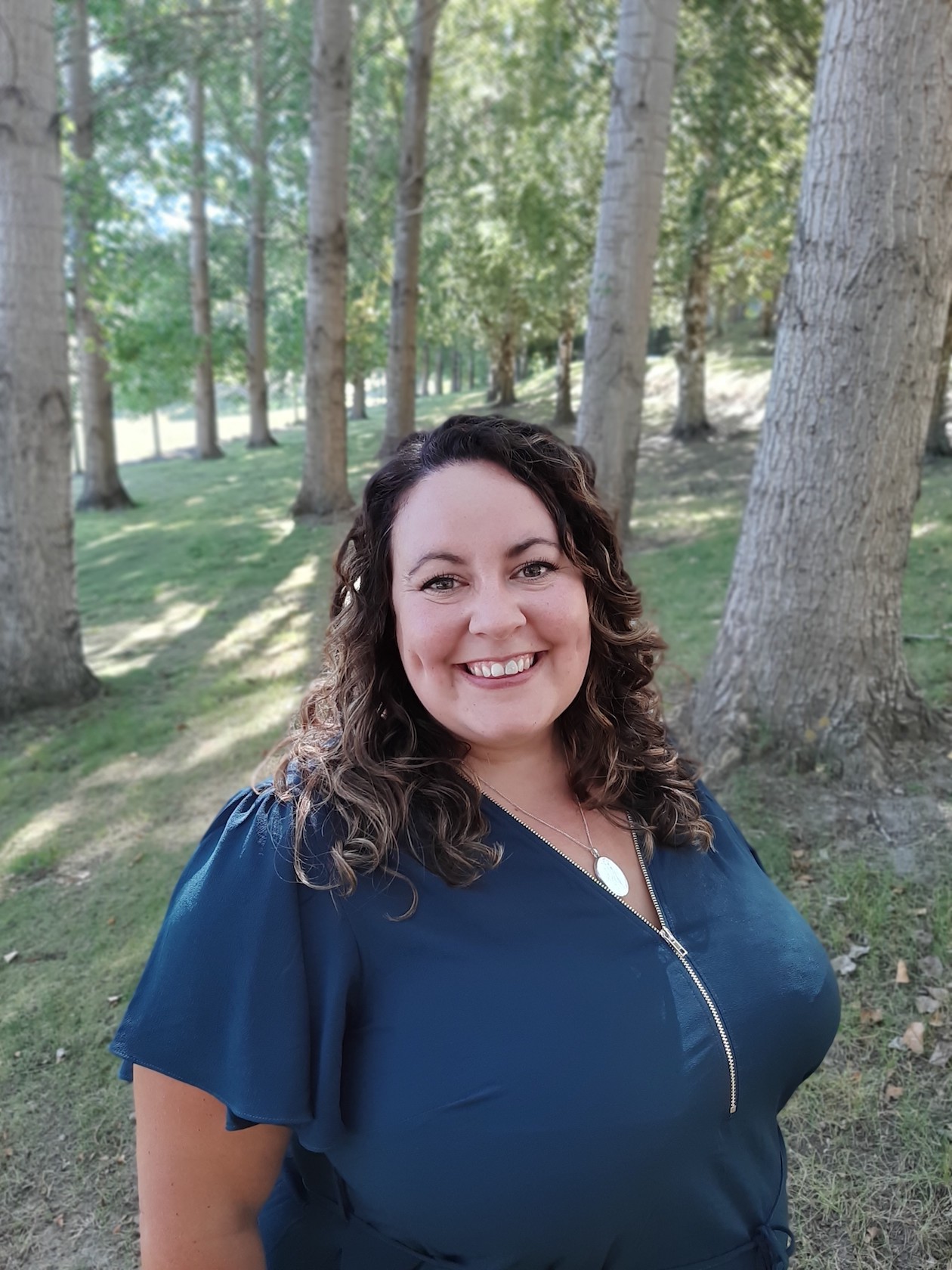Manaaki whenua, Manaaki tangata, Haere whakamua. Caring for land and people has always been the path to the future for Ziptrek Ecotours. Two years ago Ziptrek became Queenstown’s first company to achieve zero carbon business status through Ekos, a carbon management entity helping organisations with minimise and offset to an international standard; but the journey began from Ziptrek’s inception all…
A red wine from the heart of New Zealand’s pinot noir country has secured its place among the 10 best wines from around the globe in the International Wine Challenge 2021. The Valli Gibbston Vineyard Pinot Noir 2019 from Central Otago claimed the IWC Sustainable Trophy, also winning the Central Otago Pinot Noir Trophy and being declared…
It was celebrations all round when Queenstown faces and personalities starred in an advertisement which took out gold in the casting category of the recent Asia Pacific film awards. The Australasian Writers and Art Directors Awards are hotly contested every year, showcasing creativity and excellence across disciplines ranging from advertising and design to film and entertainment. Queenstown Casting Director Jackie…
A multi-award-winning distillery in the heart of Queenstown is celebrating the region’s resilience with an exclusive Queenstown Edition Gin.
A multi-award-winning distillery in the heart of Queenstown is celebrating the region’s resilience with an exclusive Queenstown Edition Gin.
The limited-edition gin has been released by Broken Heart Spirits to mark its ninth birthday, described as ‘warming and rounded’ to sooth the tastebuds in the heart of winter.
On the eve of its release Broken Heart owner and master distiller Joerg Henkenhaf and his team had reason to celebrate further, with news the Queenstown Edition Gin was awarded gold in the NZ Spirits Awards 2021.
The awards are in their third year and celebrate the growth in world-class spirits produced by ever-increasing numbers of New Zealand distillers, benchmarked against overseas imported spirits.
The Queenstown Edition Gin becomes the twelfth product in a wide range of locally crafted gins, rums, whiskies and liqueurs produced by the distillery.
It combines botanical essences from its Navy Strength Gin (which weighs in at an impressive 57% proof) with the alcohol content of the company’s Original Gin, creating a new and unique flavour profile.
Joerg says the Queenstown Edition Gin is reflective of the unique Central Otago landscape and seasons. It’s distilled in Arrowtown using untouched pure spring water from Paradise, flowing from Mount Aspiring National Park.
Authenticity and simplicity are at the heart of the outstanding spirits created by Joerg, who comes from a German family where making wine, cider and schnapps was part of everyday life and recipes passed through the generations.
He develops his own recipes for the eleven natural botanicals across the flavour profiles of spice, floral, dry, freshness and earthiness which are ‘carried’ by the alcohol and captured in each bottle.
“This gin celebrates what Queenstown is all about, it’s Queenstown in a bottle,” says Joerg.
“I like my gins to be clean and clear. The more alcohol, the more flavour it can hold, but I create a balanced gin where the potency of the botanicals creates a different flavour profile while still being super-simple.
“Whether visitors or locals have spent a day on the slopes, on the trails or on the golf course, sitting down to a glass of this with tonic and a sprig of thyme or rosemary captures the essence of Queenstown’s heart.”
The story of Broken Heart is one OF a broken heart, when Joerg’s good friend Bernd Schnabel, with whom he’d spent three years working on a gin recipe, died two weeks after being diagnosed with cancer.
“It was a very sad time and my heart was broken, so I decided that I could share this superb gin with the world and call it Broken Heart in his memory.
“All these years later I’m still inspired to create new things. A recipe is something which starts in your head, it’s all about smelling and tasting.
“At the start, my dream was to see my bottle in a bar in Auckland and today we’re selling gin and our other spirits in 18 countries and winning awards. I live for Broken Heart, it’s my life.”
Those awards keep rolling in – last month Broken Heart learned its Navy Strength Gin had been awarded a Gold Award and its Spiced Whisky a Bronze Award at the Tokyo Whisky and Spirit Competition 2021.
Those keen to buy the Queenstown Edition Gin should head to www.brokenheartspirits.com for a limited time only.
Delays in nutting out the detail of new accessibility legislation are frustrating and detrimental to the wellbeing of close to three million New Zealanders*, says Dyslexia Foundation of New Zealand (DFNZ).
Delays in nutting out the detail of new accessibility legislation are frustrating and detrimental to the wellbeing of close to three million New Zealanders*, says Dyslexia Foundation of New Zealand (DFNZ).
The Government has already committed to introducing critical legislation to accelerate accessibility, enabling New Zealand to become more welcoming and accessible for disabled people and others with accessibility needs, for example through being neurodivergent, blind/low vision, and/or ageing.
Disability Issues Minister Hon. Carmel Sepuloni was expected to put a proposal to Cabinet this month detailing this legislation. This has now been delayed until September.
DFNZ Chair of Trustees Guy Pope-Mayell says the delays are being attributed to more time being needed for officials to complete an analysis of options for new legislation.
“We understand, and are supportive of, the need to get it right. At the same time, we’d like to see more urgency in prioritising this life-changing piece of legislation,” Pope-Mayell says.
“It is estimated close to three million New Zealanders with permanent access needs stand to benefit from this legislation. Delays at this stage just prolong the inequities and difficulties of everyday life.
Currently, the burden is on people with access needs to fight for their right to accessible housing, transport, information, workplace, and digital spaces. This is discriminatory, and exhausting.”
“There is also a whole raft of people with short-term circumstances who experience daily barriers to goods and services, including carers of young children, people with English as a second language, and those with short term injuries. These people also will benefit from legislation that removes the barriers.”
Pope-Mayell says it is important that everyone understands that access needs are not something ‘other people’ have. All of us are susceptible if circumstances change or due to ages and stages of life.
“This new legislation will touch all our lives. Broken a leg, or sprained an ankle, making it harder to get around? Couldn’t get through a shop door with a pushchair? Found it difficult to get about with young children or a disabled relative or friend? Struggled to navigate a website that is important to you? Then you have experienced access needs,” he says.
In essence, access needs are difficulties accessing physical environments, transportation, and facilities and services open or provided to the public, as well as products, services, information and communications, including technology and systems. The proposed new legislation will set the initial bar, and progressively lift it over time for accessibility and equity, providing explicit expectations backed by enforceable regulations. In simple terms it will facilitate the identification and removal of barriers.
The impetus for new accessibility legislation has come from the Access Alliance, which comprises a growing number of organisations from the disability and neurodiversity sectors, working with a range of business champions , and nearly 7000 individual supporters, representing and advocating for people with access needs.
DFNZ joined the Access Alliance in January, as a Supporting Organisation and a Campaign Partner. The Alliance says the proposed legislation has the support of all major Parliamentary parties.
“This drive for new legislation acknowledges that current Human Rights legislation is insufficient. It does not set clear and specific expectations on accessibility and it has no teeth. In contrast, we expect the new legislation to do all this and more. And the sooner it is introduced the better,” Pope-Mayell says.
*Dyslexia Foundation of New Zealand, based on international occurrence, conservatively estimates at least 10% of the New Zealand population have dyslexia, and at least 20% collectively have some form of neuro-difference, such as Asperger’s, Autism, Dyscalculia, Dysgraphia, ADHD, Traumatic Brain Injury, Fetal Alcohol Syndrome.
Blind Low Vision NZ estimates 180,000 New Zealanders are blind or have low vision.
The 2013 New Zealand Disability Survey estimated that a total of 1.1 million New Zealanders were disabled (Disability Survey: 2013, Statistics New Zealand). Disability was defined as any self-perceived limitation in activity resulting from a long-term condition or health problem lasting or expected to last 6 months or more and not completely eliminated by an assistive device. People were not considered to have a disability if an assistive device such as glasses or crutches eliminated their impairment.
2018 New Zealand Census. Seniors (over 65) comprise 15.22% of the population, or 715,173 people.
A parcel of land with historic connections to the early development of Queenstown’s Frankton Flats is up for sale after sitting empty for 108 years.
A parcel of land with historic connections to the early development of Queenstown’s Frankton Flats is up for sale after sitting empty for 108 years.
The 5,199sqm piece of land, spread over three titles, was bought in 1913 by Robert Grant as part of the Grant Family Farm and has never been on the market.
The land’s perched on the hillside above Queenstown’s Frankton Road with outstanding views towards The Remarkables mountain range, an easy two-minute walk to lakeside walking and biking tracks and the Frankton Marina.
Of the farmland originally bought by Robert Grant, 72 hectares was sold to the Queenstown Airport Corporation in December 1996, enabling the runway extension and development of playing fields alongside the Queenstown Events Centre.
A further 277 hectares on Queenstown Hill is still being farmed by Robert’s descendants operating in a family trust. It’s the trust that has decided to sell the Frankton Road parcel of land to help fund an innovative retail development project.
The Grant family will use proceeds of the sale to further develop their ‘Country Lane’ boutique and artisan style retail hub where old cabins salvaged from the former council-run Queenstown campground are being given a new lease of life.
Bruce Grant and his sister Tineke Enright, fourth generation guardians of Robert’s property, aren’t particularly interested in farming so when their parents Tilly and Bill Grant retired they began transforming some of the old farm buildings.
The first to get a makeover was the old barn built by their grandfather in the early 50’s which houses furniture, homewares and Tineke’s childrens’ clothing label Pretty Kiwi. The centre’s now also home to the Buzzstop Honey Centre, Mount Michael Wines, Posh Paws, Ride To The Sky, Bright Ink and Wakatipu Therapeutic Massage.
Five former campground cabins are being established on the site which will house new businesses due to open in spring with everything from pottery to plants.
Bruce Grant says selling the Frankton Road property will hugely subsidise the new development.
“It’s a pretty cool spot, a stunning piece of land that’s already zoned differently to the rest of the property so it’s ripe for development,” he says. “The topography of the land lends itself to multiple units like the Mantra Marina apartments across the road and there’s plenty of good access.”
Marketed by David Poppleton and Peter Nelson of Harcourts Queenstown, the land will be sold by deadline sale on June 10 to give buyers the opportunity to make conditional offers while they seek independent advice on the use of the land.
David and Peter describe this as a “once in a lifetime opportunity” to buy a large section, with plenty of potential, in an outstanding location.
They believe it will most likely appeal to a developer keen on building units, someone looking to subdivide into sections or to land-bank for the future.
Access to the site is from the first corner of Marina Drive and there are also two legal access points from the private road above it which also serves as an access road to the rest of the farm.
The Frankton Road street frontage is 110 metres along the south boundary and a small block of council-owned land with a tree-covered pathway leads from the land’s main access point on Marina Drive to the bus stop opposite the Marina entrance.
A business training day in Alexandra supported community needs to the tune of thousands of dollars.
A business training day in Alexandra supported community needs to the tune of thousands of dollars.
The annual Harcourts ‘Highland Gathering’ brought real estate teams from six offices in Alexandra, Cromwell, Queenstown, Dunedin, Wanaka and South Otago together for a day of training, fun and celebration at Alexandra’s The Cellar Door.
The day was centred around health and wellbeing for the 120 agents attending, but also included a special community fundraising element.
Splitting into ten teams, they were given just one hour to sell as many bottles as possible of The Good Oil products, produced in the South Island and made available for community fundraising.
Using all the ‘tools’ they use daily to sell real estate, they sold a whopping 1832 bottles of The Good Oil and received a number of generous donations. In total they raised $6186 for the Otago Community Hospice Trust which provides care and support for people in the region with life-limiting illness.
Harcourts Highland Group is a long-term supporter of the hospice service but managing director Warwick Osborne said even he was “blown away” by the energy in the room during the fundraising challenge.
“To raise over $6000 in an hour is an excellent amount and an amazing effort by everyone involved,” he said.
“We support our community in any way we can and ‘doing the right thing’ by encouraging our team and our clients to get behind such a worthy cause was the icing on the cake for a day of learning, fun and laughter.”
Alexandra Harcourts manager Andrew Little and his team were thrilled to present the $6186 cheque to Viviann McFadzien of the Alexandra Hospice Shop this week.
Cookie Time was today named the inaugural winner of the NZ’s Most Trusted Cookies category in the Reader’s Digest Most Trusted Brands Awards.
Cookie Time was today named the inaugural winner of the NZ’s Most Trusted Cookies category in the Reader’s Digest Most Trusted Brands Awards.
In celebration, Cookie Time head office and bakery has been transformed into a vibrant drive-through experience, with 10,000 free Original™ Chocolate Chunk Cookies to give away.
On the first day of business, 7 February 1983, some 70 jars of Original Chocolate Chunk Cookie were delivered to 70 Christchurch dairies. More than 38 years later, Cookie Time has finally gained official Trusted Brands recognition as a cookies’ maker.
“Cookie Time is proud to be the inaugural winner of the Trusted Brands Cookies Category,” says Managing Director Guy Pope-Mayell.
“Up to now we’ve been misjudged a biscuit and been highly commended in the biscuits category. We have been loudly protesting for years that cookies and biscuits have very distinct differences – judging cookies in the biscuits category is like judging wine in the beer category.
“For 38 years we’ve been making NZ’s favourite cookies, and we’re delighted to officially now be NZ’s most trusted cookies. I’ve lost count of the number of times we’ve been erroneously called a biscuit company; it’s great for the business to finally be recognised as a cookie company,” he says.
So, what is the difference between cookies and biscuits?
“Cookies generally have a softer texture, more depth and look homemade. The treat element comes from inclusions, like generous chocolate chunks, and they are comforting to take time out and eat, evoking childhood memories,” says Pope-Mayell.
“Biscuits in contrast are generally thin, hard and crunchy and each one looks pretty much identical. The treat element comes from enrobing (enclosing in chocolate) or having a filling sandwiched between two biscuits. They’re more of a quick eat and one is not usually enough.”
The Cookie Time drive through on Main South Road in Templeton, Christchurch is open from 10am – 4pm today. Baking started at 7am, with the 10,000 cookies prepared in batches and baked in traditional rack ovens like all Cookie Time cookies.
“The drive-through is a fantastic way for us to mark this accolade and give back to the local community,” Pope-Mayell says.
The Original Chocolate Chunk Cookie was the first cookie designed and marketed for individual sale in NZ, a category Cookie Time still leads today. In 1983, Cookie Time’s first year of production, 500,000 of the large size Original Chocolate Chunk Cookies were baked. Now it bakes around 30 million large cookies a year.
About Cookie Time
Cookie Time Limited is an iconic, family owned business, founded in Christchurch in 1983. It has a proud New Zealand-made heritage and is passionate about making great tasting quality products with real ingredients. Entrepreneurial and innovation-led, the company has an enviable portfolio of New Zealand’s favourite treat, snack and functional foods. These include Cookie Time cookies, Christmas Cookies, Bumper and the patented OSM brand.
Smart entrepreneurship, innovation and ingenuity are driving forces, delivering on the Group’s vision – a taste for every occasion, a smile on every face. The business includes both domestic and international operations, including Cookie Time Cookie Bars in Queenstown and Japan, as well as online store munchtime.co.nz. It also runs the Cookie Time Charitable Trust, founded in 2003 to help New Zealand children discover their gifts.
Bespoke architectural homes in a park-like setting are at the heart of a ‘legacy project’ in Wanaka for someone whose name is synonymous with New Zealand building.
Bespoke architectural homes in a park-like setting are at the heart of a ‘legacy project’ in Wanaka for someone whose name is synonymous with New Zealand building.
Astute businessman and building industry pioneer David Reid founded the business which bore his name in 1993. It grew to be recognised throughout New Zealand and Australia, winning many national awards.
And now those years of experience and entrepreneurship are being poured into The Terrace Wanaka, a boutique lifestyle legacy project that’s been 26 years in the making.
After selling the David Reid Homes NZ business in 2005 then growing an Australian network to 20 branches by 2008, David refocused his energies on meeting the needs of his home city following the devastating Christchurch earthquakes. He formed a construction company aimed at reducing cost and construction timelines while increasing quality.
But stunning Wanaka, with its enviable lake and mountain lifestyle, was always calling.
David first made his mark on a large parcel of land bathed in sunshine between the Cardrona Valley and the Lake Wanaka township in 1995, where he built his family home.
With a long-term vision for how Wanaka could and would grow, The Terrace Wanaka is his legacy project, 26 years in the making and after his family has flown the coop.
Neither a retirement village nor a ‘standard’ subdivision, The Terrace Wanaka is designed for discerning buyers who will appreciate extensive green spaces, interlinking walkways between homes, and the opportunity for visiting family and friends to enjoy this uniquely Southern Lakes lifestyle in safety and comfort.
The initial homes on offer in this small and secluded development are within walking distance to award-winning cafes and restaurants, a state-of-the-art Medical Centre and boutique shops.
The sparkling waters of Lake Wanaka are a short drive (or E-bike) away for summer adventures by boat, kayak or paddleboard. In winter, the base buildings of three world-class skifields are all within a 35-minute drive.
No matter the season, Wanaka and the surrounding district boasts an outstanding array of restaurants, cafes, bars, retail outlets and nearby wineries.
David is thrilled to bring a lifetime of delivering “outstanding quality without compromise” to The Terrace Wanaka.
“Although I have a lifetime passion for residential construction, particularly new methodology and technology resulting in more efficiency, what drives me now is in developing these principles from the ground up, developing the land first,” he says.
“I live here, Wanaka’s my home, and I’d love others to come and check out our world. Our new home here has enabled us to offer outstanding surroundings and lifestyle to my parents, and we’ve future-proofed with plenty of space for the grandkids.
“The homes are styled for relaxing in the peace and quiet that Wanaka’s renowned for, while being set up for comfortable entertaining all year round.
“We’ve been local to the Wanaka area for quite a while and know a thing or two about the weather, so we orientate to the sun and views to design spaces that work regardless of the season.”
Homes at The Terrace Wanaka, a unique vantage point with panoramic vistas of just about every mountain top visible in the area, are all thoughtfully planned to orientate North to Northwest, making the most of thermal heat gain.
Homes are designed to be thermally efficient for maximum summer and winter comfort and come in a range of sizes and configurations. Homes start at $2.245million NZD and each is on a freehold title which comes with a share of the surrounding parkland.
Moves by Government agencies to stop accepting cheques are callous, short-sighted and infringe fundamental human rights for more than a million New Zealanders, according to the Dyslexia Foundation of New Zealand (DFNZ).
Moves by Government agencies to stop accepting cheques are callous, short-sighted and infringe fundamental human rights for more than a million New Zealanders, according to the Dyslexia Foundation of New Zealand (DFNZ).
DFNZ addressed the Parliamentary Finance & Expenditure Select Committee this morning (April 7) supporting a petition by Port Waikato MP Andrew Bayley challenging moves by Government agencies such as the IRD, ACC and Kiwibank to stop accepting cheques. It is calling for an inquiry to assess whether such agencies have and will put in place adequate provisions for people who cannot safely access or afford to access government services electronically.
Guy Pope-Mayell, DFNZ Chair of Trustees, says DFNZ estimates more than 1 million people with dyslexia or other neurodiversities* may be negatively impacted by having the ability to pay by cheque removed. On top of that there is a large cohort of people with disabilities, the older population and people who are sight-impaired who are similarly impacted.
“With Covid-19 and lockdowns, some moves by IRD, ACC and other businesses to ditch cheques last year have slipped a little under the radar. The reality is that denying people the ability to make payments by cheque removes a fundamental human right to equitably access goods and services,” Pope-Mayell says.
Issues of financial independence, privacy, convenience and mental wellbeing arise with this denial. Other groups which have submitted concerns to the Select Committee include Blind Low Vision NZ (formerly the Blind Foundation), St John, Federated Farmers, Grey Power and Rural Women New Zealand.
“There is a callous irony in removing cheques as a payment option at the same time as inclusion is high on the political agenda. Society generally is moving at light speed towards inclusion and taking measures to ensure that barriers are identified and removed,” Pope-Mayell says.
“In fact, the Accessible Aotearoa Act, championed by the Access Alliance, is a cross-party supported piece of legislation due to go before Cabinet next month that aims to identify and remove barriers for New Zealanders with temporary or permanent impairments. Creating a barrier by eliminating cheques is completely at odds with this.”
In a nutshell, individuals with dyslexia and other neuro-disabilities tend to find internet banking highly stressful, with fear of inputting wrong information or pushing the wrong button leading to financial loss. The older population and people who are sight-impaired also face these stressors.
“Failing to navigate the internet banking process successfully then impacts mental wellbeing, adding to feelings of vulnerability, lack of confidence and low self-esteem. Privacy issues arise if people have to ask others to help, and in the process have to disclose personal financial information, and the risk of scams is also ever present,” Pope-Mayell says.
Another disadvantaged group is those without easy access to internet banking services, and those who cannot afford digital devices.
“While this issue may seem of little consequence to those who are ‘digital natives’ it is of deep concern to a wide cross-section of society,” Pope-Mayell says.
*Based on international occurrence, DFNZ conservatively estimates at least 10% of the New Zealand population have dyslexia, and at least 20% of the population collectively have some form of neuro-difference, such as Aspergers, Autism, Dyscalculia, Dysgraphia, ADHD, Traumatic Brain Injury or Fetal Alcohol Syndrome.
ABOUT DYSLEXIA FOUNDATION NEW ZEALAND
DFNZ’s mission is to increase the awareness, recognition, understanding and acceptance of dyslexia as an alternative way of thinking. DFNZ is focused on action-oriented activities to champion change for dyslexic individuals, and on providing information, tools and resources to inspire others to do the same.
Since inception in November 2006, DFNZ has built its reputation on successful advocacy and action and has become the foremost lobby group in this area. From lobbying the Government for dyslexia to be officially recognised, achieved in 2007, through to working closely with the Government on the inclusive education agenda and raising the Youth Court age, the landscape has been fundamentally changed.
In advocating for dyslexia, DFNZ has noted that experiences and issues for those dyslexia are often similar to those for other neurodiversities. And that getting it right for dyslexics means getting it right for all. For a number of years, therefore, DFNZ has included other neurodiversities within the scope of its work. DFNZ has successfully run a number of dyslexiaadvocacy/action weeks between 2007 and 2015. In 2016, DFNZ convened a landmark Neurodisabilities Forum to explore vulnerability in the justice system. In October 2020, it hosted the Neurodiversity Leadership Workplace Forum focused on recognising the strengths of diverse brains in the workplace, and earlier this year it hosted a Belief Change Family Forum to foster paradigm change (mindshift) in understanding and harnessing the strengths of dyslexia and neurodiversity.
Thirty-five years of outstanding contributions to the survival of New Zealand’s unique species is under threat at Queenstown’s Kiwi Birdlife Park.
Thirty-five years of outstanding contributions to the survival of New Zealand’s unique species is under threat at Queenstown’s Kiwi Birdlife Park.
As the park marks the milestone anniversary this year, celebrations are muted as it faces the very real possibility of closure without continued funding and financial support.
So with the Easter break and school holidays just around the corner, it’s launching a ’35 for 35’ campaign for the month of April, encouraging each visitor to donate $35 for the experience — a mere dollar for each year of wildlife conservation.
The park has been a labour of love for the Wilson family – 35 years ago metalsmith Dick Wilson and his wife Noeleen had an unlikely ‘vision’ of building the resort town’s first birdlife and conservation park on an overgrown piece of wasteland.
Today that same park is owned by their son Paul and his wife Sandra, and their own son Richard also works in the business.
Over the decades it’s attracted thousands of visitors every year and is recognised nationwide for its conservation success stories, taking part in a number of ‘breed-for-release’ programmes and displaying over 20 species of native wildlife. It’s also planted nearly 20,000 native trees to provide essential food and shelter to wild native birds.
Now the future is looking grim, with revenue down 80% year-to-date and funding from the Wildlife Institute Relief Fund only covering a proportion of overall costs. Those costs are incurred whether they’re open or not, with two or three keepers required on site every day to care for and feed the wildlife.
Understandably, Paul Wilson says the family is incredibly saddened by the downturn after 35 years of hard work.
“We’re trying so many new and different ways to keep our head above water, but this is more than just about the money,” he says.
“This park has always been about wildlife survival. We’re passionate about wildlife and so are all our staff.
“We’ve developed one of the best whio breeding programmes in the country and it would be a devastating loss to the whio population if this couldn’t continue. In 2019 and 2020 we built an outstanding new Kiwi House which we’re still paying off, so we’d really love to share this amazing new exhibit with some visitors.
“We’re so proud of what we’ve built up here but this is the biggest challenge we’ve faced in 35 years and we need support more than ever. We need people to come and see one of the biggest kiwi display houses in the country, celebrate our breeding programmes in the knowledge that they’re contributing to future conservation success, and enjoy the conservation show which is celebrating its 20th anniversary.
“We know we’re loved by locals and by visitors from near and far, so everyone who visits will know their $35is going a very long way, hopefully for the next 35 years, for a very good cause.”
KEY KIWI BIRDLIFE PARK MILESTONES:
- January 13 1986 opened its doors to it’s first visitors
- 1989 – Joins captive breed-for-release programme for critically endangered black stilts with only 23 left in the world.
- 1996 – First kiwi (Koru) hatched at the park.
- 2001 – Conservation Show launched, first free-flight bird show in New Zealand.
- 2004 – First Haast tokoeka (kiwi) chick hatched, the first time this species ever hatched in captivity.
- 2005- Our audio guide, a self guided audio tour, launched.
- 2010 – New enclosure showcases NZ’s sub-antarctic island species.
- 2012 – Joins captive breed-for-release programme for whio (blue duck)
- 2013- Became the first institute in NZ to be accredited with providing positive animal welfare.
- 2015 – New reptile wing built.
- 2017- celebrated the release of our 200th pateke duckling into the wild since the year 2000.
- 2018 – Bush regeneration programme was intensified with the cutting down of 129 invasive pine and fir trees and the planting of 5,000 native trees.
- 2019- New falcon exhibit built and breed for release programme for South Island kaka started.
- 2020 – State-of-the-art new Kiwi House built
Well-known Queenstown general manager, Jenni Powell, has taken up a new role in the IT services industry with Both Brains.
Well-known Queenstown general manager, Jenni Powell, has taken up a new role in the IT services industry with Both Brains.
Jenni Powell has taken the helm of IT services company Both Brains in a newly-created GM role.
Formerly general manager at VisitorPoint Ltd, and previously New Zealand Sales Manager for Southern Discoveries and the InterCity Group, Jenni has also been chair of the Backpacker Youth Adventure Tourism Association (BYATA) since 2019.
Both Brains provides services for a wide range of business from SME’s to large multinational companies, and recent expansion into the tourism sector is a natural fit for Jenni’s background and network.
“I’m stoked to join the Both Brains team as I know first-hand how essential it is to work with forward-thinking solution driven partners aiming to take the pain points away from day-to-day operations,” says Jenni.
“So many of the services Both Brains continues to offer to clients in different industries would be of immense value to tourism businesses. In the current environment it’s critical that businesses see good value for spend, the ability to scale on demand and work with partners they know they can trust to get the job done.”
Both Brains founder and managing director Ryan Howard has welcomed Jenni to the role, which is based in Queenstown.
“Jenni is known to be an extremely hard worker, very professional and always passionate about the business she is in, which are qualities we live by at Both Brains,” he says.
“We’ve seen good growth over the last few years which is why we’re investing in a GM enabling me to concentrate on the technical side of the business. Jenni’s experience in managing businesses through growth and her customer-focused approach will be a welcome addition to our team.”
Both Brains has just celebrated eight years in business and Ryan took the opportunity post-lockdown to enjoy the lifestyle Queenstown offers while running his Auckland business remotely.
“There’s massive growth in Queenstown in the tech sector. Pre covid, global connectivity was easy with an international airport on our doorstep. Investing further and bringing Jenni onboard locally is the perfect opportunity to expand our reach and a ‘no brainer’ for me,” he says.
Ryan says Jenni has first-hand knowledge of the current challenges facing the tourism industry.
“We’re hoping we have the perfect solution — world class service and easily scalable packages. Our services are used by businesses in all industries but really do lend themselves to tourism operators wanting to ensure they’re the most effective they can be with smaller workforces, and ready to rapidly scale up when international borders re-open.”

